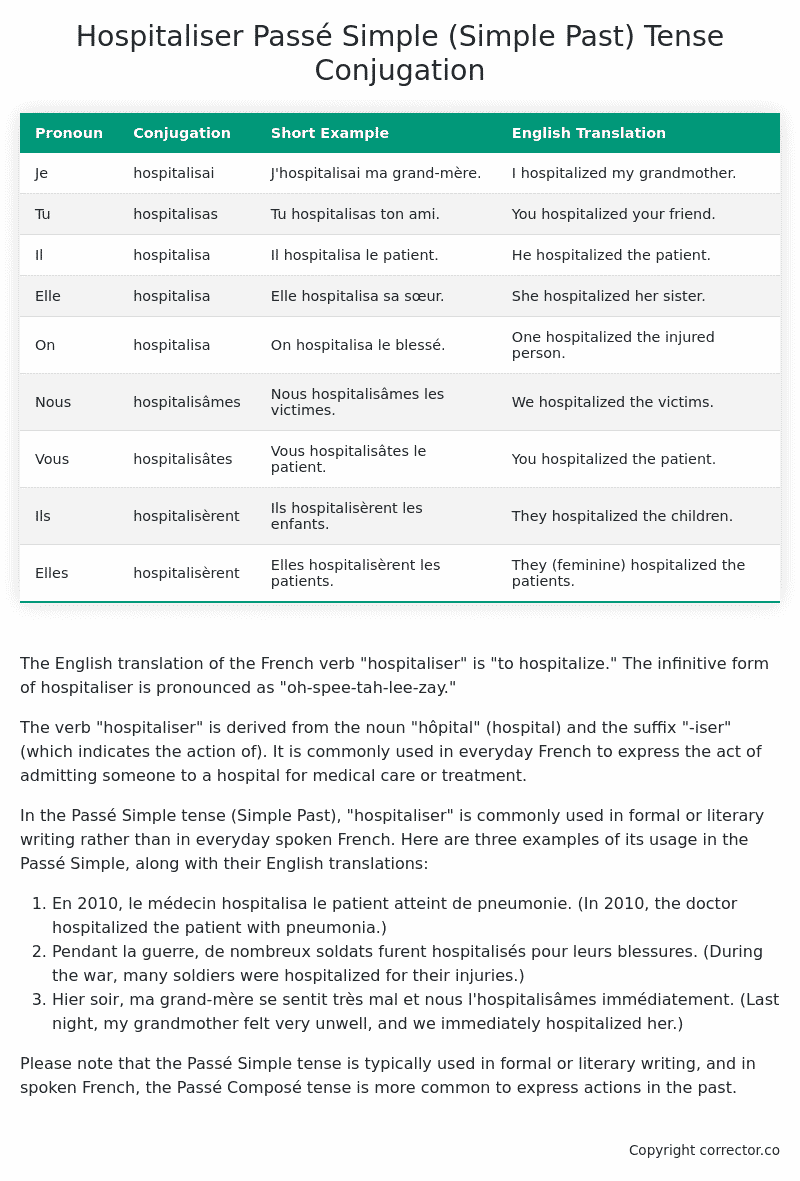Passé Simple (Simple Past) Tense Conjugation of the French Verb hospitaliser
Introduction to the verb hospitaliser
The English translation of the French verb “hospitaliser” is “to hospitalize.” The infinitive form of hospitaliser is pronounced as “oh-spee-tah-lee-zay.”
The verb “hospitaliser” is derived from the noun “hôpital” (hospital) and the suffix “-iser” (which indicates the action of). It is commonly used in everyday French to express the act of admitting someone to a hospital for medical care or treatment.
In the Passé Simple tense (Simple Past), “hospitaliser” is commonly used in formal or literary writing rather than in everyday spoken French. Here are three examples of its usage in the Passé Simple, along with their English translations:
- En 2010, le médecin hospitalisa le patient atteint de pneumonie. (In 2010, the doctor hospitalized the patient with pneumonia.)
- Pendant la guerre, de nombreux soldats furent hospitalisés pour leurs blessures. (During the war, many soldiers were hospitalized for their injuries.)
- Hier soir, ma grand-mère se sentit très mal et nous l’hospitalisâmes immédiatement. (Last night, my grandmother felt very unwell, and we immediately hospitalized her.)
Please note that the Passé Simple tense is typically used in formal or literary writing, and in spoken French, the Passé Composé tense is more common to express actions in the past.
Table of the Passé Simple (Simple Past) Tense Conjugation of hospitaliser
| Pronoun | Conjugation | Short Example | English Translation |
|---|---|---|---|
| Je | hospitalisai | J’hospitalisai ma grand-mère. | I hospitalized my grandmother. |
| Tu | hospitalisas | Tu hospitalisas ton ami. | You hospitalized your friend. |
| Il | hospitalisa | Il hospitalisa le patient. | He hospitalized the patient. |
| Elle | hospitalisa | Elle hospitalisa sa sœur. | She hospitalized her sister. |
| On | hospitalisa | On hospitalisa le blessé. | One hospitalized the injured person. |
| Nous | hospitalisâmes | Nous hospitalisâmes les victimes. | We hospitalized the victims. |
| Vous | hospitalisâtes | Vous hospitalisâtes le patient. | You hospitalized the patient. |
| Ils | hospitalisèrent | Ils hospitalisèrent les enfants. | They hospitalized the children. |
| Elles | hospitalisèrent | Elles hospitalisèrent les patients. | They (feminine) hospitalized the patients. |
Other Conjugations for Hospitaliser.
Le Present (Present Tense) Conjugation of the French Verb hospitaliser
Imparfait (Imperfect) Tense Conjugation of the French Verb hospitaliser
Passé Simple (Simple Past) Tense Conjugation of the French Verb hospitaliser (You’re reading it right now!)
Passé Composé (Present Perfect) Tense Conjugation of the French Verb hospitaliser
Futur Simple (Simple Future) Tense Conjugation of the French Verb hospitaliser
Futur Proche (Near Future) Tense Conjugation of the French Verb hospitaliser
Plus-que-parfait (Pluperfect) Tense Conjugation of the French Verb hospitaliser
Passé Antérieur (Past Anterior) Tense Conjugation of the French Verb hospitaliser
Futur Antérieur (Future Anterior) Tense Conjugation of the French Verb hospitaliser
Subjonctif Présent (Subjunctive Present) Tense Conjugation of the French Verb hospitaliser
Subjonctif Passé (Subjunctive Past) Tense Conjugation of the French Verb hospitaliser
Subjonctif Imparfait (Subjunctive Imperfect) Tense Conjugation of the French Verb hospitaliser
Conditionnel Présent (Conditional Present) Tense Conjugation of the French Verb hospitaliser
Conditionnel Passé (Conditional Past) Tense Conjugation of the French Verb hospitaliser
Conditionnel Passé II (Conditional Past II) Tense Conjugation of the French Verb hospitaliser
L’impératif Présent (Imperative Present) Tense Conjugation of the French Verb hospitaliser
L’impératif Passé (Imperative Past) Tense Conjugation of the French Verb hospitaliser
L’infinitif Présent (Infinitive Present) Tense Conjugation of the French Verb hospitaliser
L’infinitif Passé (Infinitive Past) Tense Conjugation of the French Verb hospitaliser
Le Participe Présent (Present Participle) Tense Conjugation of the French Verb hospitaliser
Le Participe Passé (Past Participle) Tense Conjugation of the French Verb hospitaliser
Struggling with French verbs or the language in general? Why not use our free French Grammar Checker – no registration required!
Get a FREE Download Study Sheet of this Conjugation 🔥
Simply right click the image below, click “save image” and get your free reference for the hospitaliser Passé Simple tense conjugation!

Hospitaliser – About the French Passé Simple (Simple Past) Tense
Formation
Usage
Narration
Historical Context
Interactions with other tenses
Passé Composé
Imparfait
Conditional and Subjunctive
Summary
I hope you enjoyed this article on the verb hospitaliser. Still in a learning mood? Check out another TOTALLY random French verb conjugation!


